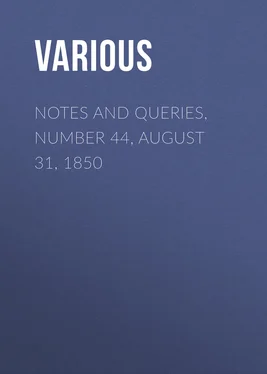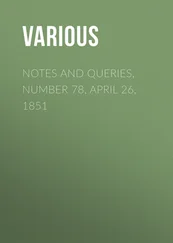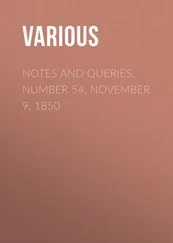Various - Notes and Queries, Number 44, August 31, 1850
Здесь есть возможность читать онлайн «Various - Notes and Queries, Number 44, August 31, 1850» — ознакомительный отрывок электронной книги совершенно бесплатно, а после прочтения отрывка купить полную версию. В некоторых случаях можно слушать аудио, скачать через торрент в формате fb2 и присутствует краткое содержание. Жанр: foreign_antique, periodic, foreign_edu, на английском языке. Описание произведения, (предисловие) а так же отзывы посетителей доступны на портале библиотеки ЛибКат.
- Название:Notes and Queries, Number 44, August 31, 1850
- Автор:
- Жанр:
- Год:неизвестен
- ISBN:нет данных
- Рейтинг книги:3 / 5. Голосов: 1
-
Избранное:Добавить в избранное
- Отзывы:
-
Ваша оценка:
- 60
- 1
- 2
- 3
- 4
- 5
Notes and Queries, Number 44, August 31, 1850: краткое содержание, описание и аннотация
Предлагаем к чтению аннотацию, описание, краткое содержание или предисловие (зависит от того, что написал сам автор книги «Notes and Queries, Number 44, August 31, 1850»). Если вы не нашли необходимую информацию о книге — напишите в комментариях, мы постараемся отыскать её.
Notes and Queries, Number 44, August 31, 1850 — читать онлайн ознакомительный отрывок
Ниже представлен текст книги, разбитый по страницам. Система сохранения места последней прочитанной страницы, позволяет с удобством читать онлайн бесплатно книгу «Notes and Queries, Number 44, August 31, 1850», без необходимости каждый раз заново искать на чём Вы остановились. Поставьте закладку, и сможете в любой момент перейти на страницу, на которой закончили чтение.
Интервал:
Закладка:
Various
Notes and Queries, Number 44, August 31, 1850
NOTES
GRAVESEND BOATS
While so much has been said of coaches, in the early numbers of "Notes and Queries" and elsewhere, very little notice has been taken of another mode of conveyance which has now become very important. I think it may amuse some of your readers to compare a modern Gravesend boat and passage with the account given by Daniel Defoe, in the year 1724: and as it is contained in what I believe to be one of his least known works, it may probably be new to most of them. In his Great Law of Subordination , after describing the malpractices of hackney coachmen, he proceeds:
"The next are the watermen; and, indeed, the insolence of these, though they are under some limitations too, is yet such at this time, that it stands in greater need than any other, of severe laws, and those laws being put in speedy execution.
"Some years ago, one of these very people being steersman of a passage-boat between London and Gravesend, drown'd three-and-fifty people at one time. The boat was bound from Gravesend to London, was very full of passengers and goods, and deep loaden. The wind blew very hard at south-west, which being against them, obliged them to turn to windward, so the seamen call it, when they tack from side to side, to make their voyage against the wind by the help of the tide.
"The passengers were exceedingly frighted when, in one tack stretching over the stream, in a place call'd Long-Reach, where the river is very broad, the waves broke in upon the boat, and not only wetted them all, but threw a great deal of water into the boat, and they all begg'd of the steersman or master not to venture again. He, sawey and impudent, mock'd them, ask'd some of the poor frighted women if they were afraid of going to the Devil; bid them say their prayers and the like, and then stood over again, as it were, in a jest. The storm continuing, he shipp'd a great deal of water that time also. By this time the rest of the watermen begun to perswade him, and told him, in short, that if he stood over again the boat would founder, for that she was a great deal the deeper for the water she had taken in, and one of them begg'd of him not to venture; he swore at the fellow, call'd him fool, bade him let him alone to his business, and he would warrant him; then used a vulgar sea-proverb, which such fellows have in their mouths, 'Blow Devil, the more wind, the better boat.'
"The fellow told him in so many words he would drown all the passengers, and before his face began to strip, and so did two more, that they might be in condition to swim for their lives. This extremely terrify'd the passengers, who, having a cloth or tilt over them, were in no condition to save their lives, so that there was a dreadful cry among them, and some of the men were making way to come at the steersman to make him by force let fly the sail and stand back for the shore; but before they could get to him the waves broke in upon the boat and carried them all to the bottom, none escaping but the three watermen that were prepar'd to swim.
"It was but poor satisfaction for the loss of so many lives, to say the steersman was drown'd with them, who ought, indeed, to have died at the gallows, or on the wheel, for he was certainly the murtherer of all the rest.
"I have many times pass'd between London and Gravesend with these fellows in their smaller boats, when I have seen them, in spite of the shrieks and cries of the women and the persuasions of the men passengers, and, indeed, as if they were the more bold by how much the passengers were the more afraid; I say, I have seen them run needless hazards, and go, as it were, within an inch of death, when they have been under no necessity of it, and, if not in contempt of the passengers, it has been in meer laziness to avoid their rowing; and I have been sometimes oblig'd, especially when there has been more men in the boat of the same mind, so that we have been strong enough for them, to threaten to cut their throats to make them hand their sails and keep under shore, not to fright as well as hazard the passengers when there was no need of it.
"One time, being in one of these boats all alone, coming from London to Gravesend, the wind freshen'd and it begun to blow very hard after I was come about three or four mile of the way; and as I said above, that I always thought those fellows were the more venturous when their passengers were the most fearful, I resolved I would let this fellow alone to himself; so I lay down in the boat as if I was asleep, as is usual.
"Just when I lay down, I called to the waterman, 'It blows hard, waterman,' said I; 'can you swim?' 'No, Sir,' says he. 'Nor can't your man swim neither?' said I. 'No, Sir,' says the servant. 'Well then,' says I, 'take care of yourselves, I shall shift as well as you, I suppose:' and so down I lay. However, I was not much disposed to sleep; I kept the tilt which they cover their passengers with open in one place, so that I could see how things went.
"The wind was fair, but over-blow'd so much, that in those reaches of the river which turn'd crossway, and where the wind by consequence was thwart the stream, the water went very high, and we took so much into the boat, that I began to feel the straw which lay under me at the bottom was wet, so I call'd to the waterman, and jesting told him, they must go all hands to the pump; he answered, he hoped I should not be wet; 'But it's bad weather, master,' says he, 'we can't help it.' 'No, no,' says I, ''tis pretty well yet, go on.'
"By and by I heard him say to himself, 'It blows very hard,' and every now and then he repeated it, and sometimes thus: ''Twill be a dirty night, 'twill be a terrible night,' and the like; still I lay still and said nothing.
"After some time, and his bringing out several such speeches as above, I rous'd as if I had but just wak'd; 'Well, waterman,' says I, 'how d'ye go on?' 'Very indifferently,' says he; 'it blows very hard.' 'Ay, so it does,' says I; 'where are we?' 'A little above Erith,' says he; so down I lay again, and said no more for that time.
"By and by he was at it again, 'It blows a frett of wind,' and 'It blows very hard,' and the like; but still I said nothing. At last we ship'd a dash of water over the boat's head, and the spry of it wetted me a little, and I started up again as if I had been asleep; 'Waterman,' says I, 'what are you doing? what, did you ship a sea?' 'Ay,' says the waterman, 'and a great one too; why it blows a frett of wind.' 'Well, well,' says I, 'come, have a good heart; where are we now?' 'Almost in Gallions,' says he, 'that's a reach below Woolwich.'
"Well, when we got into the Gallions reach, there the water was very rough, and I heard him say to his man, 'Jack, we'll keep the weather-shore aboard, for it grows dark and it blows a storm.' Ay, thought I, had I desir'd you to stand in under shore, you would have kept off in meer bravado; but I said nothing. By and by his mast broke, and gave a great crack, and the fellow cry'd out, 'Lord have mercy upon us!' I started up again, but still spoke cheerfully; 'What's the matter now?' says I. 'L—d, Sir,' say's he, 'how can you sleep? why my mast is come by the board.' 'Well, well,' says I, 'then you must take a goose-wing.' 'A goose-wing! why,' says he, 'I can't carry a knot of sail, it blows a storm.' 'Well,' says I, 'if you can't carry any sail, you must drive up under shore then, you have the tide under foot:' and with that I lay down again. The man did as I said. A piece of his mast being yet standing, he made what they call a goose-wing sail, that is, a little piece of the sail out, just to keep the boat steddy, and with this we got up as high as Blackwall; the night being then come on and very dark, and the storm increasing, I suffer'd myself to be persuaded to put in there, though five or six mile short of London; whereas, indeed, I was resolv'd to venture no farther if the waterman would have done it.
Читать дальшеИнтервал:
Закладка:
Похожие книги на «Notes and Queries, Number 44, August 31, 1850»
Представляем Вашему вниманию похожие книги на «Notes and Queries, Number 44, August 31, 1850» списком для выбора. Мы отобрали схожую по названию и смыслу литературу в надежде предоставить читателям больше вариантов отыскать новые, интересные, ещё непрочитанные произведения.
Обсуждение, отзывы о книге «Notes and Queries, Number 44, August 31, 1850» и просто собственные мнения читателей. Оставьте ваши комментарии, напишите, что Вы думаете о произведении, его смысле или главных героях. Укажите что конкретно понравилось, а что нет, и почему Вы так считаете.












